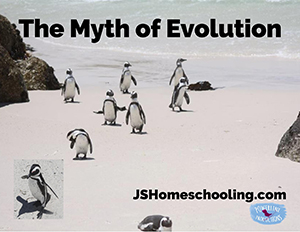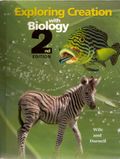A scientific hypothesis is an unproven scientific statement.
A scientific theory is a hypothesis which has been tested and verified many many times.
A Scientific Law is a theory which has been tested and verified many more times.
Evolution has continued to fail test after test but somehow scientists and textbook writers have started calling it a theory, or even a scientific law. Many secular scientists today believe that it is fact and should be taught as fact. When selecting science curriculum for your students it is important to know exactly what position the teacher or textbook writer takes on this important subject.
What can I teach at home?
Once again this year I have the pleasure of partnering with my friends to teach our children Biology and Chemistry. The students and I meet once per week after they have spent days at home with their parents going over the material in the Apologia textbook. I have enjoyed using these text books because they explain the material very well and they address the suject of evolution head on. If you would like to read a review of the biology textbook, please see our earlier blog entries at Exploring Creation with Biology Review.
Many of us have more questions than answers on the subject of evolution. We often begin with the question, so what? What does it matter if the earth is millions and millions of years old or just several thousand? Does it matter if the book of Genesis is literal or figurative? Does it really make a difference whether the world was created in six literal days or “God days” which actually lasted millions of years as we count them? The answers are unequivocal. It matters a great deal. Yes, it matters. And yes, it makes a difference.
Why does it matter?
The evidence that it matters, and why it matters, comes more from the fruit of scientists’ denials than it does from the Scriptures and the scientific discoveries. In times past scientists fell into three distinct groups, those who honored Scripture and wanted to find the proofs that support it, those who chose to deny the One True God and were trying to disprove the Bible, and those who had never heard of Him and were trying to understand creation.
In the 1800s Charles Darwin latched onto a hypothesis proposed by several scientists in the latter two groups and wrote his infamous book, The Origin of Species. Mr. Darwin’s book came out in a time when the scientific community was gradually turning from loving God and fellow man to promoting itself. Humanism, the idea that man is the end of all things, was flourishing. Men were worshipping themselves instead of God. The times were ripe for an explanation which could excuse any denial of God. “In the beginning God created the heavens and the earth.” (Genesis 1:1 NIV) started being ignored.
Charles Darwin had been trained in seminary and knew the Scriptures. But, Charles had poured over the writings of atheistic scientists who impacted his thinking so that he began to doubt the Genesis account of Creation. He is an early example of how filling your head with unproven godless ideas erodes away your faith.
This has been the pattern of many scientists and students since that time. One by one, as Christians study science and are bombarded with the ideas of evolution, old earth (millions and millions of years old), and the so called “metaphorical nature” of the Genesis record, they lose faith. One by one they seem to believe that if Genesis is not literal then neither must other books be. If many books are not literal, they ask, “how can I trust the accounts of the Gospel writers?” One by one they come to the conclusion that Jesus and God are not real.
Now, keep this in mind: many people are just looking for a way to sin and not be accountable to God for their sin. If God is Creator, then we answer to Him. If there is no God, we can do whatever we want to do. Belief in evolution frees sinful mankind from having to give an account to God.
Christians in the past century did not image how damaging the theory of evolution would be to their children’s faith and their own faith. Many Christian parents believed that it was so important for their children to receive a thorough understanding of what the scientific community was accomplishing that they didn’t think of the dangers. I have read books by scientists who passionately defended creation, then ten years down the line the same scientist is no longer talking about God, but rather “intelligent design”. I fear to read what they would say ten years after that.
It is not wrong for Christians to study the theory of evolution, but do we want our children studying evolution without learning about Creation and the evidence to support it? Don’t think your child will be the exception. Most public school children are indoctrinated with evolution and believe that it is true, unless Christian parents have taken the time to teach the truth about Creation. Do you want to use the same textbooks that are leading a whole generation astray in your home? Is it worth the risk? While studying science, make sure that you study the mounting evidence which disproves evolution. Answers in Genesis and the Institute for Creation Research are organizations dedicated to finding and presenting just such proofs.
What do I consider when selecting science classes?
“In the beginning was the Word, and the Word was with God, and the Word was God,”
(John 1:1 NIV).
“All Scripture is God-breathed and is useful for teaching, rebuking, correcting, and training in righteousness, so that the man of God may be thoroughly equipped for every good work,”
(II Timothy 3:16-17 NIV).
“Your commands make me wiser than my enemies, for they are ever with me. I have more insight than all my teachers, for I meditate on your statutes. I have more understanding than the elders, for I obey your precepts,”
(Psalms 119:98-100 NIV).
All things must be tested in light of the Scripture. If a course or curriculum disagrees with Scripture, it is false. Don’t use it. If a book or article belittles Scripture in any way, run from it! If you stick to studying and teaching the Bible and materials which do not contradict the Bible (some subjects are neutral) you and your students will excel.
I could get into an explanation about how we can be confident of the accuracy of the Bible we have today, but I’ll save that for another day. In the mean time we must remember that unlike scripture writers, science writers are fallible. Any scientist can write anything they like about their field. Unless they start printing things that are proven false by scientific experimentation or discovery, nobody can say anything stronger than, “I disagree!” For that reason alone every science book requires scrutiny. Every science lesson needs to be examined in the light of scripture.
Evolution is a very broad hypothesis. It may never be completely proven false. Bit by bit it has been eroded by new discoveries, but atheistic scientists have latched onto it like doctrine of a new religion. They will not let go. The truth is that there is no reasoning with a fanatic. We cannot hope to persuade the evolutionists to stop. What we can do is pray and help the next generation to steer clear of this fanaticism.
Dr. Gary Parker, biologist, paleontologist, educator, speaker, and author, is a much better authority of the subject of creation than I. He has worked as a teacher, faculty member, and speaker for the Institute for Creation Research, Answers in Genesis, Eastern Baptist College, Dordt College, Christian Heritage College, and Clearwater Christian College. The founder of the Creation Adventures Museum in Arcadia, FL, will be joining us at Finish Well 2013. We hope you will too! Please check out the web site FinishWellCon.com for more information.
Until next time, Happy Homeschooling!
Laura Nolette
Pages: 1 2









